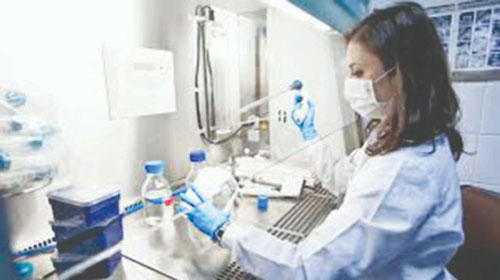SCIENTISTS have developed a new vaccine for treating cancer, it combines chemotherapy and immunotherapy, and it has shown promise in mouse models.
A team of scientists has recently developed a new vaccine for treating cancer, and it has shown promising results in mice — even in difficult-to-treat cancer.
The treatment combines chemotherapy and immunotherapy in a single injection, which may open the door to a personalized, highly effective, and easy-to-administer therapy.
The research will now need to move to preclinical trials, which may then lead to trials in humans. Two key approaches to treating cancer are chemotherapy and immunotherapy.
According to the National Cancer Institute (NCI), chemotherapy aims to kill cancer cells by stopping or reducing their growth.
However, it can also affect healthy cells, so it typically causes significant side effects for the person receiving it. These effects may include tiredness, nausea, hair loss, and mouth sores.
On the other hand, the NCI explain that immunotherapy mobilizes a person’s immune system to target cancer cells.
Often, the immune system will do this without any support. However, cancers can protect themselves from a person’s immune system. Immunotherapy helps increase the immune system’s effectiveness.
Immunotherapy also comes with side effects, which will vary depending on the type of immunotherapy a person is receiving. Furthermore, for the most difficult-to-treat cancers — such as triple-negative breast cancer — immunotherapy generally has limited effects.
“Triple-negative breast cancer does not stimulate strong responses from the immune system, and existing immunotherapies have failed to treat it.”
“In our system, the immunotherapy attracts numerous immune cells to the tumor while the chemotherapy produces a large number of dead cancer cell fragments that the immune cells can pick up and use to generate an effective tumor-specific response.”
By combining the two cancer treatments, the scientists behind the new research are hoping to get the “best of both worlds.”
The treatment the team tested in the new study is the result of over 10 years of development. In 2009, a group led by corresponding study author Prof. David Mooney — Robert P. Pinkas Family Professor of Bioengineering at the Harvard John A. Paulson School of Engineering and Applied Sciences in Cambridge, MA — reported that they had developed an implantable cancer vaccine that showed promise in mouse models.









